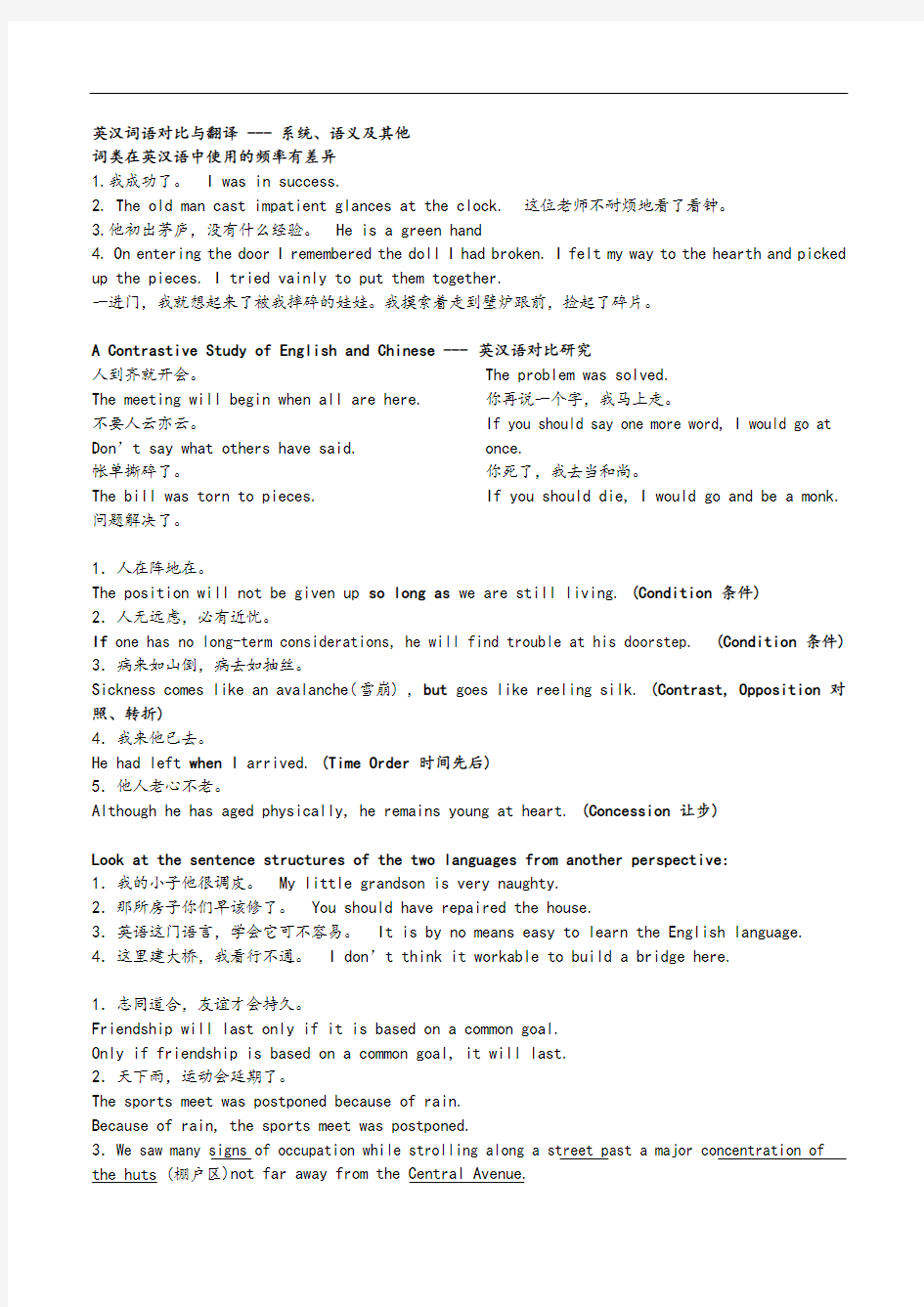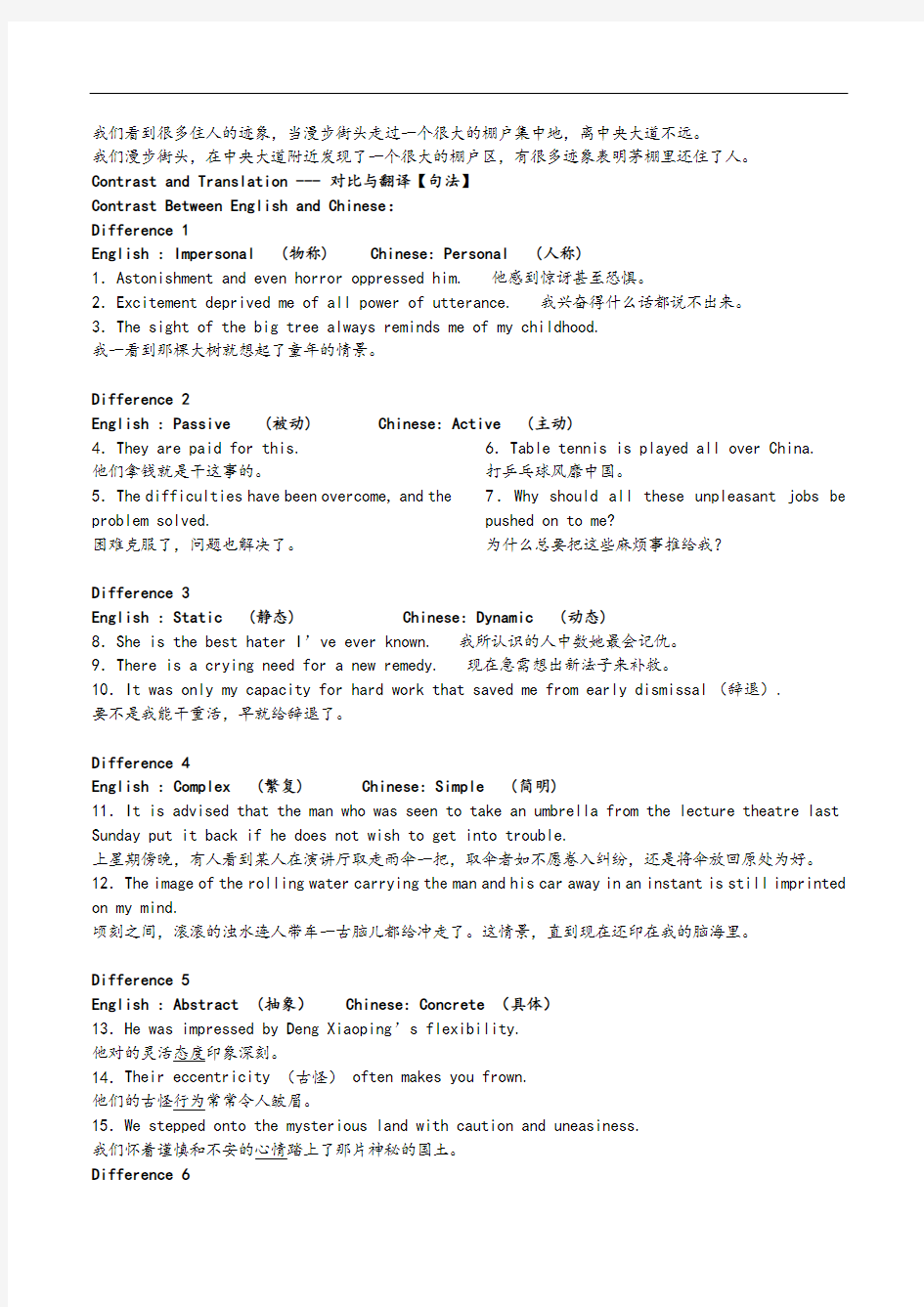

英汉词语对比与翻译 --- 系统、语义及其他
词类在英汉语中使用的频率有差异
1.我成功了。 I was in success.
2. The old man cast impatient glances at the clock. 这位老师不耐烦地看了看钟。
3.他初出茅庐,没有什么经验。 He is a green hand
4. On entering the door I remembered the doll I had broken. I felt my way to the hearth and picked up the pieces. I tried vainly to put them together.
一进门,我就想起来了被我摔碎的娃娃。我摸索着走到壁炉跟前,捡起了碎片。
A Contrastive Study of English and Chinese --- 英汉语对比研究
人到齐就开会。
The meeting will begin when all are here. 不要人云亦云。
Don’t say what others have said.
帐单撕碎了。
The bill was torn to pieces.
问题解决了。The problem was solved.
你再说一个字,我马上走。
If you should say one more word, I would go at once.
你死了,我去当和尚。
If you should die, I would go and be a monk.
1.人在阵地在。
The position will not be given up so long as we are still living.(Condition 条件)
2.人无远虑,必有近忧。
If one has no long-term considerations, he will find trouble at his doorstep.(Condition 条件) 3.病来如山倒,病去如抽丝。
Sickness comes like an avalanche(雪崩) , but goes like reeling silk. (Contrast, Opposition 对照、转折)
4.我来他已去。
He had left when I arrived.(Time Order 时间先后)
5.他人老心不老。
Although he has aged physically, he remains young at heart. (Concession 让步)
Look at the sentence structures of the two languages from another perspective:
1.我的小子他很调皮。 My little grandson is very naughty.
2.那所房子你们早该修了。 You should have repaired the house.
3.英语这门语言,学会它可不容易。 It is by no means easy to learn the English language. 4.这里建大桥,我看行不通。 I don’t think it workable to build a bridge here.
1.志同道合,友谊才会持久。
Friendship will last only if it is based on a common goal.
Only if friendship is based on a common goal, it will last.
2.天下雨,运动会延期了。
The sports meet was postponed because of rain.
Because of rain, the sports meet was postponed.
3.We saw many signs of occupation while strolling along a street past a major concentration of the huts (棚户区)not far away from the Central Avenue.
我们看到很多住人的迹象,当漫步街头走过一个很大的棚户集中地,离中央大道不远。
我们漫步街头,在中央大道附近发现了一个很大的棚户区,有很多迹象表明茅棚里还住了人。Contrast and Translation --- 对比与翻译【句法】
Contrast Between English and Chinese:
Difference 1
English : Impersonal (物称) Chinese: Personal (人称)
1.Astonishment and even horror oppressed him. 他感到惊讶甚至恐惧。2.Excitement deprived me of all power of utterance. 我兴奋得什么话都说不出来。3.The sight of the big tree always reminds me of my childhood.
我一看到那棵大树就想起了童年的情景。
Difference 2
English : Passive (被动) Chinese: Active (主动)
4.They are paid for this.
他们拿钱就是干这事的。
5.The difficulties have been overcome, and the problem solved.
困难克服了,问题也解决了。6.Table tennis is played all over China.
打乒乓球风靡中国。
7.Why should all these unpleasant jobs be pushed on to me?
为什么总要把这些麻烦事推给我?
Difference 3
English : Static (静态) Chinese: Dynamic (动态)
8.She is the best hater I’ve ever known. 我所认识的人中数她最会记仇。
9.There is a crying need for a new remedy. 现在急需想出新法子来补救。
10.It was only my capacity for hard work that saved me from early dismissal(辞退).
要不是我能干重活,早就给辞退了。
Difference 4
English : Complex (繁复) Chinese: Simple (简明)
11.It is advised that the man who was seen to take an umbrella from the lecture theatre last Sunday put it back if he does not wish to get into trouble.
上星期傍晚,有人看到某人在演讲厅取走雨伞一把,取伞者如不愿卷入纠纷,还是将伞放回原处为好。12.The image of the rolling water carrying the man and his car away in an instant is still imprinted on my mind.
顷刻之间,滚滚的浊水连人带车一古脑儿都给冲走了。这情景,直到现在还印在我的脑海里。
Difference 5
English : Abstract (抽象) Chinese: Concrete (具体)
13.He was impressed by Deng Xiaoping’s flexibility.
他对的灵活态度印象深刻。
14.Their eccentricity (古怪) often makes you frown.
他们的古怪行为常常令人皱眉。
15.We stepped onto the mysterious land with caution and uneasiness.
我们怀着谨慎和不安的心情踏上了那片神秘的国土。
Difference 6
English : Hypotactic (形合) Chinese: Paratactic (意合)
Explicit cohesion (显性联接)Implicit coherence (隐性连贯)
16.If you don’t compare, you’re in the dark, but the moment you do, you get a shock.
不比不知道,一比吓一跳。(比较:如果不比,你就不知道,一旦比了,你会吓一跳。)
17.As Tom has failed to come due to his sudden illness, we have to ask you to take his place. 汤姆突然病了,没能来,我们只好请你顶他。
(比较:因为汤姆突然病了,所以他没能来,因而我们只好请你顶他。)
Difference 7
English : plain and Chinese: rhythmic and
factual symmetrical
(讲平实)(重韵律)
18.He is a smart, eloquent, upright and well-informed lawyer.
他是一位律师,脑子灵,口才好,为人正直,见多识广。
他是一位律师,聪明、善辩、正直,而且有见识。
19.She was an intelligent, attractive and somewhat temperamental daughter of a well-to-do doctor. 她聪明、漂亮、爱耍点小脾气,是一个家道小康的医生的女儿。
Please translate the following sentences:
1.Not only politeness but an attitude of reverence is demanded in church.
在教堂里不仅要有礼貌,而且要有一种虔诚的态度。
2.We will not attack unless we are attacked. 人不犯我,我不犯人。
3.It never occurred to me that she was so dishonest. 我从来也没有想到她竟这么不老实。4.My ignorance has made a fool of myself. 我孤陋寡闻,出洋相了。
5.However sly a fox may be, it is no match for a good hunter.
狐狸再狡猾也斗不过好猎手。
6.He has an unpleasant habit of expressing contradictory ideas in rapid succession.
她有个不讨人喜欢的习惯:一会儿一个看法,自相矛盾。
7.His frequent interference in other people’s private affairs is very annoying.
他常常干与别人的私事,真恼人。
8.If he does not come here, I won’t go there. 他不来,我就不去。
9.A slight discrepancy leads to a great error. 差之毫厘,谬以千里。
10.In Africa, I met a boy, who was crying bitterly as if his heart would break, and said, when I spoke to him, that he was very hungry, because he had had no food for two days.
在非洲我曾经遇到过一个男孩,他痛哭流涕,很伤心。我问问他,他说他已经两天没吃东西,肚子饿极了。11.What they wanted most was an end of uncertainties.
他们最渴望的是结束这种摇摆不定的局面。
12.The best solution to the problem is to conduct investigation.
解决问题的最好办法是进行调查研究。
中西方思维差异对翻译的影响
英汉思维差异比较:
1、汉字的象形性(ideographic vs. alphabetic)
人:分腿站立,顶天立地 man 雨 rain 伞 umbrella
从 follow(比,北,化――细说汉字)
2、词语的直观性强
百褶裙 pleated skirt 露背装 halter top 回形针 paper clip
3、汉语爱以具体比喻抽象
1)蚕食 Nibble
2)我军势如破竹,打得敌军落花流水。 Our army won a smooth and overwhelming victory.
3)聪明人未雨绸缪,愚蠢者临渴掘井。
Wisdom prepares for the worst; but folly leaves the worst for the day it comes.
1、汉语词义较笼统,英语语义较具体
1)“车来了”(车=bus, minibus, lorry, taxi, bike, motorcycle…)“Here comes the …”
2)胡子:full beard大胡子,shadow小胡子,络腮胡子whiskers;handlebars/moustache八字胡,goatee
山羊胡,tile beard瓦形胡,military moustache军人胡,stubble beard残须
3)“借我一支笔”(笔=pen, ball pen, pencil, a piece of chalk, color pen)
2、汉语注重篇章的整体性及对称平衡,英语强调篇章句式结构的严谨
善欲人见,不是真善;恶恐人知,便是大恶。
A good deed is no good deed if it is done for show. An evil is all the worse if it is covered up.
3、中国人天人合一,主动句、无主句、主语省略句居多
1)热得我满身大汗。 The heat made me sweat./ I was sweating all over.
2)不坚持,就会失败。
One will fail unless one preserves.
Keep on, or we will fail.
If you don’t hold on, you will fail.
本体型思维与客体型思维
The thick carpet killed the sound of my footsteps.
我走在厚厚的地毯上,一点脚步声也没有。
顺向思维与逆向思维(西方人面对未来,中国人面对过去)
Look forward to vs. look back on:想想以后,回顾以前
?---But we are getting ahead of the story.
?---All the dates mentioned in the paper have been moved back in time.
?---After you, sir. 先生,您先请。
英汉文化差异比较:
一、文化背景差异 (农业 vs. 航海)
?对牛弹琴
?teach a pig to play on the flute; cast pearls before the swine(讨厌的人)?众人拾柴火焰高。
?Many hands make light work. ?Hoist your sail when the wind is fair. ?好风快扬帆。
? A small leak will sink a great ship. ?小洞不补要沉大船。
二、风俗差异
猫头鹰 vs. as wise as an owl 龙 vs. dragon lover vs. 爱人(This is my lover!)
三、联想异同
重合(cultural overlaps):as white as snow; fox;
差异
1)一箭双雕(汉),一石两鸟(英),一掌双蝇(德),一石双兔(俄)
2)体壮如牛 as strong as a horse
如鱼得水 Like a duck to water
多如牛毛 As plentiful as blackberries 水中捞月 To fish in the air 害群之马 Black sheep
挥金如土 Spend money like water 画蛇添足 Gild the lily
归化和异化翻译
谋事在人,成事在天。
归化:Man proposes, God disposes.
异化:Man proposes, Heaven disposes.
1. Strike while the iron is hot. 趁热打铁。
2. go through fire and water赴汤蹈火
3. add fuel to the flames / pour oil on the flames
火上浇油
4. an ass in a lion’s skin 狐假虎威
5. a wolf in sheep’s clothing 笑面虎
6. kill two birds with one stone一箭双雕
7. armed to the teeth 武装到牙齿8. an eye for an eye, a tooth for a tooth 以眼还眼,以牙还牙
9. a wolf in sheep’s clothing 披着羊皮的狼
10. kill two birds with one stone 一石二鸟
11. All roads lead to Rome. 条条道路通罗马
12.笑里藏刀hide a dagger in a smile
13.天下乌鸦一般黑。
All crows are equally black
比较句子:
1. don’t lock the stable door after the horse has been stolen.
直译:不要等马被盗后,才去锁厩门。
意译:不要贼走关门。
2. Smashing a mirror is no way to make an ugly person beautiful, nor is it a way to make social problems evaporate.
直译:砸镜子不能使丑八怪变漂亮,也不能使社会问题烟消云散。
意译:砸镜子并不能解决实际问题。
3. I gave my youth to the sea and I came home gave her (my wife) my old age.
直译:我把青春献给海洋,我回家的时候便把老年给了妻子。
意译:我把青春献给海洋,等我回到家见到妻子时已经是白发苍苍了。
4. They don’t know their right hand from their left.
直译:他们分不清这是自己的右手还是左手。
意译:他们什么也不知道。
5. When Jean graduated from high school, she looked at the world through rose-colored glasses. 直译:琼高中毕业的时候,是戴着玫瑰色的眼镜看周围的一切的。
意译:琼高中毕业的时候,她把一切事情看得太简单太容易了。
修辞句型中的误区
(1)比喻:有的比喻可以直译,有的则不能
The girl is a dead shot. 这位姑娘是神枪手。(不能译作“死射手”)
After the failure of his last novel, his reputation stands on slippery grounds.
他的上部小说失败之后,声誉一落千丈。(不能译为"站在滑动的场地上了")
(2)借喻
He went west by stage coach and succumbed to the epidemic of gold and silver fever in Nevada's Washoe Region.
正:他乘公共马车到了西部,卷入了淘金热和淘银热。
the open door policy
开放政策,
the cold war
冷战,
to fish in troubled waters 混水摸鱼,
strike while the iron is hot 趁热打铁,
at sixes and sevens
乱七八糟
一些习语成语必须意译:
She was born with a silver spoon in her mouth.
You‘re talking through your had again. 你又在胡说八道了。
You should keep your nose out of here.
Good to begin well ,better to end well. 要善始善终
example:
High buildings and large mansions are springing up like mushrooms in Beijing.
译文:在,高楼大厦犹如雨后春笋般地涌现。
① A:How often do you eat here, David? B:I eat here a lot.
应译为:“你多久来这吃一次啊,大卫?我经常来这吃。”如果把“a lot”直译为“许多”或“很多很多”,这句话就不通顺了。
② A:All his geese are swans?
B: John is really such a person.
应译为:“他老是言过其实么?约翰就是这样一个人”。如果译成“他养的鹅都是天鹅。”,那听上去就会莫名其妙了。
③ It is an ill bird that fouls its own nest. 家丑不可外扬。
④ Birds of a feather flock together. 物以类聚,人以群分。
⑤ Empty vessels make the most noise. 满瓶子不响,半瓶子晃荡。
⑥ False friends are worse than bitter enemies. 明枪易躲,暗箭难防。
lick one’s boots 拍马屁Diamond cuts diamond 棋逢对手A flash in a pan 昙花一现Have one foot in the grave 风烛残年To grow like mushrooms 雨后春笋
One boy is a boy,two boys half a boy,three boys nobody.